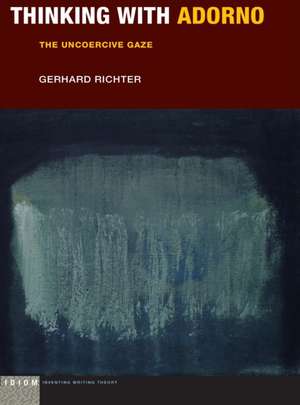Thinking with Adorno – The Uncoercive Gaze: Idiom: Inventing Writing Theory
Autor Gerhard Richteren Limba Engleză Paperback – iul 2019
Richter vividly shows how Adorno's highly suggestive--yet often overlooked--concept of the "uncoercive gaze" designates a specific kind of comportment in relation to an object of critical analysis: It moves close to the object and tarries with it while struggling to decipher the singularities and non-identities that are lodged within it, whether the object is an idea, a thought, a concept, a text, a work of art, an experience, or a problem of political or sociological theory.
Thinking with Adorno's uncoercive gaze not only means following the fascinating paths of his own work; it also means extending hospitality to the ghostly voices of others. As this book shows, Adorno is best understood as a thinker in dialogue, whether with long-deceased predecessors in the German tradition such as Kant and Hegel, with writers such as Kafka, with contemporaries such as Benjamin and Arendt, or with philosophical voices that succeeded him, such as those of Derrida and Agamben.
| Toate formatele și edițiile | Preț | Express |
|---|---|---|
| Paperback (1) | 259.61 lei 6-8 săpt. | |
| ME – Fordham University Press – iul 2019 | 259.61 lei 6-8 săpt. | |
| Hardback (1) | 701.66 lei 6-8 săpt. | |
| Wiley – iul 2019 | 701.66 lei 6-8 săpt. |
Preț: 259.61 lei
Nou
Puncte Express: 389
Preț estimativ în valută:
49.68€ • 51.87$ • 41.11£
49.68€ • 51.87$ • 41.11£
Carte tipărită la comandă
Livrare economică 04-18 aprilie
Preluare comenzi: 021 569.72.76
Specificații
ISBN-13: 9780823284023
ISBN-10: 0823284026
Pagini: 240
Dimensiuni: 187 x 229 x 17 mm
Greutate: 0.34 kg
Editura: ME – Fordham University Press
Seria Idiom: Inventing Writing Theory
ISBN-10: 0823284026
Pagini: 240
Dimensiuni: 187 x 229 x 17 mm
Greutate: 0.34 kg
Editura: ME – Fordham University Press
Seria Idiom: Inventing Writing Theory
Notă biografică
Descriere
This book argues that the work of Theodor W. Adorno is best understood through the lens of his highly suggestive-yet often overlooked-concept of the "uncoercive gaze," an innovative way of relating to the object of one's analysis that interweaves critical intimacy and analytic vigilance.












